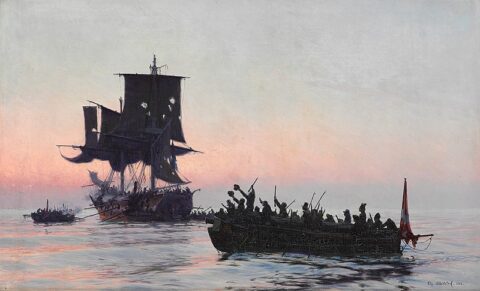On Saturday, Sir Humphrey noted the anniversary of Trafalgar and indicated that the Royal Navy’s idolization of Admiral Nelson somewhat obscures the rest of the Royal Navy’s historical role:

“Danish privateers intercepting an enemy vessel during the Napoleonic Wars”.
Oil painting by Christian Mølsted, 1888 from the Collection of the Museum of National History via Wikimedia Commons.
There is an argument, which the author has sympathy with, that the RN has perhaps idolised Nelson too much. That while he did much good, the adoration of him comes at the cost of forgetting countless other leaders and battles which have relevance to this day. This is not to denigrate or play down the impact of Trafalgar, but to ask whether we should be equally aware of other parts of Royal Navy history too. Understanding the Royal Navy of the late 18th and early 19th century can provide us with much to consider and learn from in looking at how to shape the Royal Navy of the early 21st century. If you look at the Royal Navy of today and of Nelson’s time (and throughout the Napoleonic Wars), a strong case can be made that although the technology is materially different, the missions, function, and capability that the RN offers to the Government of the day are little changed.
While we tend to fix attention mostly on the major battle of Trafalgar, the RN fulfilled a wide variety of different missions throughout the war. The fleet was responsible for blockading Europe, monitoring French movements, and providing timely intelligence on the activity of enemy fleets. Legions of smaller ships stood off hostile coasts, outside of engagement range, on lonely picket duties to track the foe. The Royal Navy also maintained forces capable of strategic blockades in locations like Gibraltar and the Skagerrak, relying on chokepoints to secure control of the sea.
The UK was a mercantile nation with a heavy reliance on trade, and with the land routes of Europe closed by Napoleon, the Merchant Navy was vital to victory. The Royal Navy played a key role in escorting ships in convoy, ensuring their protection from hostile forces and helping ensure vitally needed trade goods arrived in British ports. This included timber from colonies in North America, vital to building and repairing warships. Similarly British policy to defeat Napoleon relied on supporting continental land powers, and a steady flow of munitions and materiel were sent by sea, escorted by RN warships to Baltic ports to help support nations fighting France.
The Royal Navy maintained forces of small raiding craft to hold the French coast at risk throughout the wars, sending vessels to attack French coastal locations, capturing intelligence and tying down hundreds of French coastal artillery batteries and thousands of men who could have been deployed elsewhere to protect French soil. More widely the UK engaged in strategic raiding and blockade, for example operations in the Adriatic Campaign (1807-14) where a small number of British warships blockaded ports, conducted amphibious operations and engaged in surface combat with different foes. In the same vein the UK found itself targeted by Danish & Norwegian raiders too, who fought the so-called “Gunboat War” from 1807 to 14 against the UK, where many small scale actions between British brigs and small ships against gunboats in the Baltic. This often forgotten campaign saw violent clashes and victories on both sides with the sinking and capture of many RN vessels to protect convoy trade.
More widely the Royal Navy worked closely with the British Army in a variety of amphibious operations, providing ships to deploy and sustain the Army on campaign. There were a number of impressive amphibious failures, but also some successes too, particularly in the West Indies and Egypt, where working as part of a jointly integrated force, the Royal Navy provided fire support (and even operated Congreve land attack rockets for shore bombardment) as the British Army fought the French ashore. In the Peninsular War the RN was vital for ensuring the supply of Wellington’s forces and, where necessary evacuating them, such as during the retreat from Corunna.



